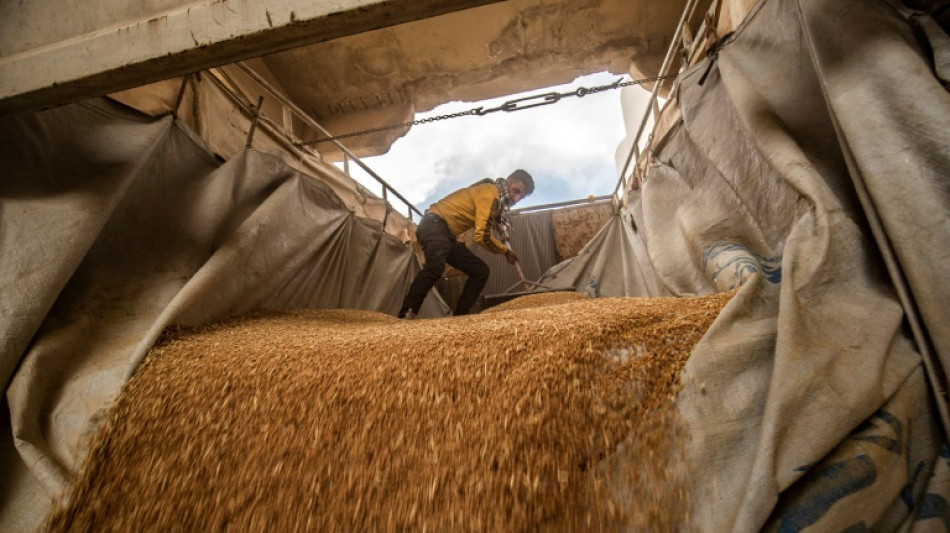
-
 Game 'reloots' African artefacts from Western museums
Game 'reloots' African artefacts from Western museums
-
Renters struggle to survive in Portugal housing crisis
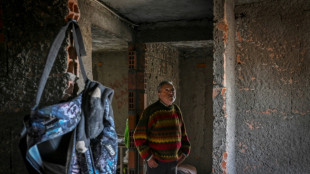
-
 Western Japan sees earliest end to rainy season on record
Western Japan sees earliest end to rainy season on record
-
Ketamine 'epidemic' among UK youth raises alarm

-
 'Shocking' COP30 lodging costs heap pressure on Brazil
'Shocking' COP30 lodging costs heap pressure on Brazil
-
India investigates 'unnatural' death of five tigers

-
 Anderson teases Dior debut with Mbappe, Basquiet and Marie Antoinette
Anderson teases Dior debut with Mbappe, Basquiet and Marie Antoinette
-
Bangladesh pushes solar to tackle energy woes
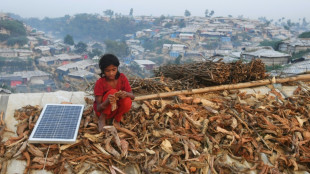
-
 Wallabies veteran White relishing 'unreal' Lions opportunity
Wallabies veteran White relishing 'unreal' Lions opportunity
-
Hong Kong's dragnet widens 5 years after national security law

-
 Tibetans face up to uncertain future as Dalai Lama turns 90
Tibetans face up to uncertain future as Dalai Lama turns 90
-
'Simple monk': the Dalai Lama, in his translator's words

-
 Man City crush Juventus, Real Madrid reach Club World Cup last 16
Man City crush Juventus, Real Madrid reach Club World Cup last 16
-
Stocks climb, dollar holds on trade hopes and rate bets

-
 Bezos, Sanchez to say 'I do' in Venice
Bezos, Sanchez to say 'I do' in Venice
-
Vinicius stars as Real Madrid ease into Club World Cup last 16

-
 New-look Wimbledon prepares for life without line judges
New-look Wimbledon prepares for life without line judges
-
Japan executes 'Twitter killer' who murdered nine

-
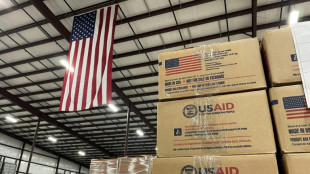 UN conference seeks foreign aid rally as Trump cuts bite
UN conference seeks foreign aid rally as Trump cuts bite
-
Dying breed: Tunisian dog lovers push to save age-old desert hound

-
 Springboks launch 'really tough season' against Barbarians
Springboks launch 'really tough season' against Barbarians
-
Syria's wheat war: drought fuels food crisis for 16 million
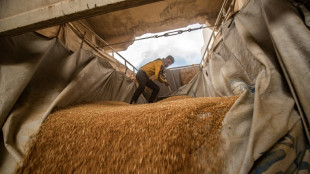
-
 Ex-All Black Kaino's Toulouse not expecting 'walkover' in Top 14 final
Ex-All Black Kaino's Toulouse not expecting 'walkover' in Top 14 final
-
Rwanda, DRC to ink peace deal in US but questions remain

-
 Combs defense team set to take the floor in trial's closing arguments
Combs defense team set to take the floor in trial's closing arguments
-
Fraser-Pryce eases through in Jamaica trials farewell

-
 US Treasury signals G7 deal excluding US firms from some taxes
US Treasury signals G7 deal excluding US firms from some taxes
-
Combs created 'climate of fear' as head of criminal ring: prosecutors

-
 Chelsea's Fernandez flying ahead of Benfica reunion at Club World Cup
Chelsea's Fernandez flying ahead of Benfica reunion at Club World Cup
-
Potgieter and Roy share PGA lead in Detroit with course record 62s

-
 City skipper Bernardo hails Guardiola's new generation
City skipper Bernardo hails Guardiola's new generation
-
Nike profits sink but company says it is turning a corner

-
 'Mission: Impossible' composer Lalo Schifrin dies aged 93
'Mission: Impossible' composer Lalo Schifrin dies aged 93
-
Ex-Ravens ace Tucker suspended 10 games over masseuse allegations

-
 Australia lead by 82 runs as West Indies' Test on a knife edge
Australia lead by 82 runs as West Indies' Test on a knife edge
-
Snow cloaks Atacama, the world's driest desert

-
 Man City crush Juve as Real Madrid aim to avoid them
Man City crush Juve as Real Madrid aim to avoid them
-
Dryburgh and Porter grab lead at LPGA pairs event

-
 Iran says no plan for new US nuclear talks, plays down impact of strikes
Iran says no plan for new US nuclear talks, plays down impact of strikes
-
City thrash Juventus to maintain 100% record at Club World Cup

-
 Brazil prodigy Estevao has unfinished business ahead of Chelsea move
Brazil prodigy Estevao has unfinished business ahead of Chelsea move
-
Mexican lawmakers vote to ban dolphin shows

-
 Trump admin insists Iran strikes success, attacks media
Trump admin insists Iran strikes success, attacks media
-
Anna Wintour steps down as US Vogue editor after nearly 40 years

-
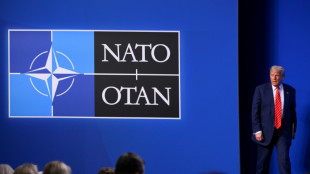 How Trump finally learned to love NATO -- for now
How Trump finally learned to love NATO -- for now
-
Faith Kipyegon misses out on bid for first female sub-4 minute mile

-
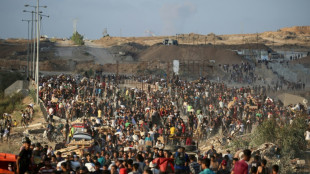 Spain PM alleges 'genocide' in Gaza as rescuers say 65 killed
Spain PM alleges 'genocide' in Gaza as rescuers say 65 killed
-
Fritz wins twice in one day to step up Eastbourne title defence

-
 St. Bernards romp at unique Swiss theme park
St. Bernards romp at unique Swiss theme park
-
RFK Jr panel votes against ingredient targeted by anti-vaxxers


Syria's wheat war: drought fuels food crisis for 16 million
Rival Syrian and Kurdish producers are scrambling for shrinking wheat harvests as the worst drought in decades follows a devastating war, pushing more than 16 million people toward food insecurity.
"The country has not seen such bad climate conditions in 60 years," said Haya Abu Assaf, assistant to the United Nations Food and Agriculture Organization (FAO) representative in Syria.
Syria's water levels have seen "a very significant drop compared to previous years, which is very worrying", Abu Assaf told AFP, as a relatively short winter rainy season and decreased rainfall take their toll.
"A gap of between 2.5 to 2.7 million tonnes in the wheat crop is expected, meaning that the wheat quantity will not be sufficient to meet local needs," Abu Assaf said, putting "around 16.3 million people at risk of food insecurity in Syria this year".
Before the civil war erupted in 2011, Syria was self-sufficient in wheat, producing an average of 4.1 million tonnes annually.
Nearly 14 years of conflict have since crippled production and devastated the economy.
The FAO estimates that harsh weather has impacted nearly 2.5 million hectares of wheat-growing land.
"Around 75 percent of the cultivated areas" have been affected, as well as "natural pastures for livestock production", said Abu Assaf.
- Imports, competition -
To bridge the wheat gap, imports would be essential in a country where around 90 percent of the population lives in poverty.
Before his ouster in an Islamist-led offensive in December, Syria's longtime ruler Bashar al-Assad used to rely on ally Russia for wheat.
In April, new authorities reported the first wheat shipment since his removal arrived in Latakia port, with more Russian shipments following.
Iraq also donated more than 220,000 tonnes of wheat to Syria.
During the war, Damascus competed with the semi-autonomous Kurdish administration in the northeast to buy wheat from farmers across fertile lands.
Last year, Assad's government priced wheat at $350 per tonne, and the Kurds at $310.
After Assad's ouster, Damascus and the Kurds agreed in March to integrate Kurdish-led institutions into the new Syrian state, with negotiations ongoing on implementation.
Damascus set wheat prices this month at between $290 and $320 per tonne, depending on the quality, plus a $130 bonus.
The Kurdish-led administration offered $420 per tonne including a $70 bonus.
- 'Poverty and hunger' -
Damascus' agriculture ministry expects a harvest of 300,000 to 350,000 tonnes in government-controlled areas this year.
Hassan Othman, director of the Syrian Grain Establishment, acknowledged Syria was not self-sufficient, in comments on state television.
But he said authorities were working "to ensure food security by importing wheat from abroad and milling it in our mills".
In northeast Syria's Amuda, farmer Jamshid Hassu, 65, inspected the tiny wheat grains from his fields, which cover around 200 hectares (around 500 acres).
Despite heavy irrigation efforts to offset scarce rainfall, he said, production has halved.
The FAO's Abu Assaf said indicators showed that "about 95 percent of rain-fed wheat has been damaged and affected", while irrigated wheat yields were down 30 to 40 percent.
Hassu, who has been farming for four decades, said he had to pump water from depths of more than 160 metres (525 feet) to sustain his crops as groundwater levels plunge.
Agriculture remains a vital income source in rural Syria, but without urgent support, farmers face ruin.
"Without support, we will not be able to continue," Hassu warned.
"People will suffer from poverty and hunger."
H.Darwish--SF-PST
